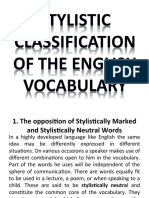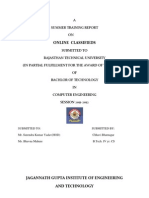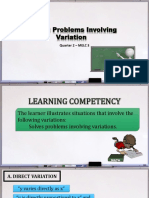0 ratings0% found this document useful (0 votes)
3 viewsSession stylistics
Session stylistics
Uploaded by
Дана ӘбдешCopyright
© © All Rights Reserved
Available Formats
Download as DOCX, PDF, TXT or read online on Scribd
0 ratings0% found this document useful (0 votes)
3 viewsSession stylistics
Session stylistics
Uploaded by
Дана ӘбдешCopyright
© © All Rights Reserved
Available Formats
Download as DOCX, PDF, TXT or read online on Scribd
You are on page 1/ 10
Session stylistics
1.Stylistics - as a linguistic science
2.Stylistics and its relations with other
linguistic sciences
3.Stylistic lexicology
Stylistic lexicology is a branch of the
stylistics which is deeply interested in the
study of
lexical units of the vocabulary which deals
with a
specific vocabulary belonging to literary and
colloquial layers of the language. They are
deeply
investigated in the works of such scholars as
Galperin I.R.(1977), Bobokhonova L.Т. (1995),
Ivashkin М.P. (1999), Skrebnyov M.Y. (2000),
Quronov D. (2004), Znamenskaya T.A. (2008),
Kukhrenko V.А. (2009), Esin A.B. (2010) and
others. Most of the mentioned scholars
propose
the study of words in clusters. So, the
appropriate
method of investigating lexicon is dividing
them
into three layers literary, neutral and
colloquial.
As it is known lexicology is the branch of
linguistics that studies the stock of words
(thelexicon) in a given language whereas
stylistic
lexicology deals with words which carry
stylistic
coloring and thus create expressiveness.
These
words are inherent in the language and make
up
vocabulary. Unlike stylistic devices
investigated
in the stylistic semasiology they do not
depend on
context, on the contrary context requires the
usage
of such words. In the research text or
scientific
discourse the abundant usage of terms is
presupposed. For instance, if we read an
excerpt
from article, on textile industry we meet
abundant
of terms connected with the very sphere of
science. Stylistic lexicology is deeply
interested in
stylistic differentiation of word-stock due to
three
layers: neutral words, literary words and
colloquial words. This type of grouping is
suggested by Prof. I.R. Galperin in his book
“Stylistics”2
. According to his distinction literary
and colloquial layers of whole word-stock of
the
English language have their own subgroups
whereas literary layer of vocabulary consists
of
legitimate members of vocabulary and they
do not
possess local or dialectal character. Thus, the
following classification of the English word-
stock
is suggested by the scholar.
Special literary vocabulary
Standard
English
vocabulary
Special colloquial
vocabulary
Terms
Archaic words
Poetic words
Nonce-words
Barbarisms
Neutral words
Slang
Jargon
Professionalism
Dialectal words
Vulgarism
Nonce-words
Neutral words
Neutral words form the lexical backbone of all
functional styles. Usually they are understood
and
accepted by all English-speaking people.
Separated from the context they do not carry
stylistic coloring. Only in the context when
their
meaning stands in the various types of
interactions
they can acquire stylistic coloring. Being the
mainsource of synonymy and polysemy,
neutral words
easily produce new meanings and stylistic
variants. Compare: log = 1) a section of the
trunk
or a main branch of a tree, when stripped of
branches; 2) log = a detailed record of a
voyage
of a ship or aircraft; 3) log = cut down (an
area of
forest) in order to exploit the timber
commercially, 4) to sleep like a log = to sleep
very
well without being woken by any voice.
Special literary vocabulary
Special literary vocabulary or bookish words
are mainly used in writing and in polished
speech.
They form stylistic opposition to their
colloquial
synonyms. Compare: infant (bookish) = child
(neutral) = kid (colloquial); parent (bookish) =
father (neutral) = daddy (colloquial); maiden
(bookish) = girl (neutral) = flapper
(colloquial);
police officer (bookish) = policeman (neutral)
=
cop (colloquial); garment (bookish) = clothes
(neutral) = kit (colloquial).
Terms are the words which denote
objects, processes, phenomena of science,
humanities, technique in a particular kind of
language or field of study. Most of the terms
are
understood by the narrow specialists and they
can
be used mostly in scientific style. But the use
of
terms is not confined to only scientific style.
They
are successfully implemented in literary style
as
well
Archaic words. Archaism comes from the
Greek word archaios and means „ancient‟.3
In the
course of language history they are ousted by
newer synonymic words.
“Methinks it is like a weasel.” (William
Shakespeare)
Archaic words are not used in present day
speech but they can be found in historical
works
to create authenticity and describe more
vividly
the epoch and its coloring. Such words can be
example for archaisms: anon – in a little while
or
soon, methinks – it seems to me, palfrey – a
small
horse, troth – faith, losel – worthless fellow,
cease
– to die, apothecary – pharmacist, damsel –
ayoung unmarried woman, poesy – poetry,
maketh
– make, thee – you.
Poetic words are the words with highly
stylistic coloring and elevated mood. They are
usually used belles-lettres style to make the
text
vivid and imbue with sense. “Poetic words are
mostly archaic or very rarely used highly
literary
words which aim at producing an elevated
effect.
They have a marked tendency to detach
themselves from the common literary word-
stock
and gradually assume the quality of terms
denoting certain definite notions and calling
forth
poetic diction.
Poetic words and expressions are called upon
to sustain the special elevated atmosphere of
poetry. This may be said to be the main
function
of poetic words.”4
The following words can be
example for poetic words: steed – horse,
quoth –
said, woe – sorrow, horse – steed, valley –
vale,
fire – devouring element, welkin – sky, morrow
–
the next day, foe – opponent or enemy,
decease –
to die.
Nonce-words (also called an
occasionalism) is a word coined to suit one
particular occasion. They are the “words for
once”
created for a single occasion to solve an
immediate problem of communication. These
words appear in the context and rarely pass
into
the language. Literary nonce words are
usually
formed by means of affixes.
Surface knowingness, sevenish (around
seven o‟clock), morish (a little more) and so
on. Barbarism (Foreignism) comes from Latin
word barbarous and means foreign.5
These are the words of foreign origin. Unlike
borrowings these words are not the part of the
language. In the literary text they are used to
create the foreign atmosphere in the speech
of the
literary personages and need a special
decoding to
be understood. This is the pragmatic manner
of
conveying the speech peculiar to the foreign
heroes in the book. As for example in the
short
story by C.Donnel “Recipe for Murder”
thheroine Madame Chalon of French origin
uses
many French words in her dialogue with
inspector Miron.
4.Stylistic phonetics
5.Stylistic syntax
You might also like
- Building Reuse: Building Reuse Sustainability, Preservation, and The Value of Design80% (5)Building Reuse: Building Reuse Sustainability, Preservation, and The Value of Design23 pages
- Stylistic Differentiation of The English Vocabulary100% (7)Stylistic Differentiation of The English Vocabulary4 pages
- Seminar 7 Stylistic Peculiarities of The English Vocabulary Items For DiscussionNo ratings yetSeminar 7 Stylistic Peculiarities of The English Vocabulary Items For Discussion4 pages
- Stylistic Classification of The English Vocabulary 2No ratings yetStylistic Classification of The English Vocabulary 221 pages
- Lecture 4.stylistic Classification of The English VocabularyNo ratings yetLecture 4.stylistic Classification of The English Vocabulary10 pages
- Lecture 4.stylistic Classification of The English VocabularyNo ratings yetLecture 4.stylistic Classification of The English Vocabulary10 pages
- Lexicology. Lesson 10. STYLISTIC CLASSFICATION OF THE ENGLISH VOCABULARYNo ratings yetLexicology. Lesson 10. STYLISTIC CLASSFICATION OF THE ENGLISH VOCABULARY35 pages
- Stylistic Differentiation of The English VocabularyNo ratings yetStylistic Differentiation of The English Vocabulary22 pages
- Stylistic Classification of The English Vocabulary PDFNo ratings yetStylistic Classification of The English Vocabulary PDF8 pages
- Stylistic Classification of The English Language VocabularyNo ratings yetStylistic Classification of The English Language Vocabulary21 pages
- Stylistic Classification of The English VocabularyNo ratings yetStylistic Classification of The English Vocabulary58 pages
- Stylistic Lexicology: Stylistic Classification of The English VocabularyNo ratings yetStylistic Lexicology: Stylistic Classification of The English Vocabulary56 pages
- paper-SOCIALLY, STYLISTICALLY AND FUNCTIONALYY DISTINGUISHED CLASSES OF WORDSNo ratings yetpaper-SOCIALLY, STYLISTICALLY AND FUNCTIONALYY DISTINGUISHED CLASSES OF WORDS3 pages
- Seminar 7 Stylistic Peculiarities of The English Vocabulary Items For DiscussionNo ratings yetSeminar 7 Stylistic Peculiarities of The English Vocabulary Items For Discussion3 pages
- Lex - Seminar 6 On Stylistic DifferentiationNo ratings yetLex - Seminar 6 On Stylistic Differentiation5 pages
- LEX Lecture 8 Stylistic DifferentiationNo ratings yetLEX Lecture 8 Stylistic Differentiation50 pages
- 83633160 Кухаренко Семинары По СтилистикеNo ratings yet83633160 Кухаренко Семинары По Стилистике144 pages
- Теор стилистика 1. Provide the stylistic classification of the English vocabulary. Explain why the neutral layer dominates over the rest of the vocabularyNo ratings yetТеор стилистика 1. Provide the stylistic classification of the English vocabulary. Explain why the neutral layer dominates over the rest of the vocabulary29 pages
- Leech_and_Short_s_Checklist_of_Lexical_FNo ratings yetLeech_and_Short_s_Checklist_of_Lexical_F26 pages
- Linguistic modality in Shakespeare Troilus and Cressida: A casa studyFrom EverandLinguistic modality in Shakespeare Troilus and Cressida: A casa studyNo ratings yet
- шпаргалка по лексикологии английского языкаNo ratings yetшпаргалка по лексикологии английского языка2 pages
- Like any linguistic issue the classification of the vocabulary here suggested is for purely stylistic purposesNo ratings yetLike any linguistic issue the classification of the vocabulary here suggested is for purely stylistic purposes37 pages
- Introduction Into Fundamentals of English Stylistics 1.style and StylisticsNo ratings yetIntroduction Into Fundamentals of English Stylistics 1.style and Stylistics7 pages
- 370-374 Classification of Stylistic Colouring Words in The English LanguageNo ratings yet370-374 Classification of Stylistic Colouring Words in The English Language5 pages
- Root Antonyms (Absolute Antonyms) Are Antonyms Having Differrent Roots, E.GNo ratings yetRoot Antonyms (Absolute Antonyms) Are Antonyms Having Differrent Roots, E.G9 pages
- Stylistic Differentiation of The English VocabularyNo ratings yetStylistic Differentiation of The English Vocabulary8 pages
- Online Classifieds: A Summer Training Report ONNo ratings yetOnline Classifieds: A Summer Training Report ON45 pages
- A1559595546 - 13530 - 4 - 2021 - Ca 1 MKTM 511 Q215152No ratings yetA1559595546 - 13530 - 4 - 2021 - Ca 1 MKTM 511 Q2151524 pages
- Unseen Impact of Online Gambling To National Integration of The Unitary State of Republic Indonesia - Khayriz Zafran NandikaNo ratings yetUnseen Impact of Online Gambling To National Integration of The Unitary State of Republic Indonesia - Khayriz Zafran Nandika5 pages
- Project Classification:: Advantages of Net Present Value (NPV)No ratings yetProject Classification:: Advantages of Net Present Value (NPV)5 pages
- Social Mobilization, Political Participation, and The Rise of Juan PeronNo ratings yetSocial Mobilization, Political Participation, and The Rise of Juan Peron21 pages
- Everything Is About Frequency and Dna Is Antenna100% (3)Everything Is About Frequency and Dna Is Antenna6 pages
- Ii-27 Ingles Ii Unidad 1 Univalle 2019BNo ratings yetIi-27 Ingles Ii Unidad 1 Univalle 2019B36 pages
- Solving Problems Involving Variation: Quarter 2 - MELC 3No ratings yetSolving Problems Involving Variation: Quarter 2 - MELC 316 pages
- Download Complete Lee s Law How Singapore Crushes Dissent 1st Edition Chris Lydgate PDF for All Chapters100% (1)Download Complete Lee s Law How Singapore Crushes Dissent 1st Edition Chris Lydgate PDF for All Chapters71 pages
- Correlation Between Tenses Mastery and Speaking Ability in Strada Budi LuhurNo ratings yetCorrelation Between Tenses Mastery and Speaking Ability in Strada Budi Luhur10 pages
- Download full Philosophy - Asking questions seeking answers 1st Edition Stephen Stich ebook all chapters50% (2)Download full Philosophy - Asking questions seeking answers 1st Edition Stephen Stich ebook all chapters55 pages






























































































